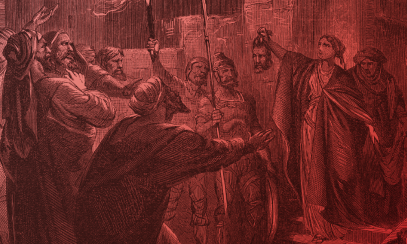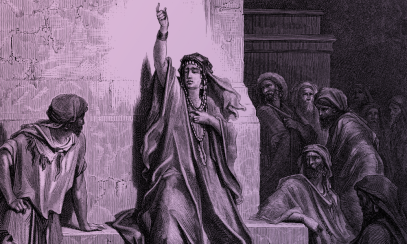
Who Exactly Were the Pharisees?
Theology 101 is taking a peek behind the scenes of some of the prominent figures, groups and events referenced in the New Testament. The goal is to provide greater context for the drama of salvation, which the Scripture communicates to us.
“Therefore, do and observe all things whatsoever they tell you, but do not follow their example. For they preach but they do not practice.” (Mt 23:3)
In Matthew’s Gospel, Jesus levies some pretty heavy criticism against the Pharisees for their hypocrisy. Apparently, Jesus observed quite a distance between what this group taught and how this group lived. So, who were they and what did they teach?
THE SPIRITUAL LINEAGE OF THE PHARISEES
Many scholars believe the Pharisees were the spiritual descendants of the Hasidim, or Pious Ones. This group was very devoted to Judaic Law. The Hasidim were strict adherents to the Torah, preferring death and torture to even the most minute violation of the Sabbath. (1 Mc 2:42) They also joined the revolt of the Maccabees against the Hellenistic Seleucids in the second century B.C. to preserve their religious freedom and push back against a paganism that was infiltrating Judaism. After the fighting, the Hasidim withdrew from the political scene and, as many historians argue, gradually merged with the Pharisees. The Pharisees eventually became a religious party of laymen and scribes in contrast to the Sadducees, who were high priests.
THE PHARISEES AND THE LAW
The Pharisees believed in both the Oral Law and the Written Law. The Oral Law consisted of the teachings of the prophets and the oral traditions of the Jewish People. The Written Law was the law given to Moses on Mount Sinai in the Torah. The Pharisees believed the Oral Law contained the meaning of, and held the key to, applying the Written Law. They asserted people needed to employ reason in interpreting the Torah when applying it to current situations. They, in short, tried to interpret the spirit of the Torah. Eventually, this oral tradition was codified in written form in the Talmud.
Accused of being “smooth interpreters” by their opponents, the Pharisees were at times considered casuistic, that is, utilizing a process to resolve moral problems by extracting theoretical rules from a particular case in order to apply the rules to a new case. Their goal was to find interpretations of the Law that would help everyone keep it because they believed that when all Israel obeyed the Torah, the Kingdom of God would come. Their approach to the Torah remains an influential force in Judaism to this day.
OTHER BELIEFS OF THE PHARISEES
First and foremost, the Pharisees believed the Law, even the priestly laws, applied to everyone. They, in essence, democratized the Law and attempted to create what can be described as a priesthood of all believers. This eventually created conflict with the Sadducees, as the Pharisees professed that God could be worshipped away from the Temple and outside of Jerusalem, that true worship consisted of prayer and the study of the Torah rather than bloody sacrifices and that the synagogue, which the Pharisees developed, was a valid institution of religious worship in addition to the Temple. In addition, the Pharisees believed in an after-life, in which God punished wickedness and rewarded righteousness. They also believed in a messiah who would usher in an era of world peace.
THE PHARISEES AND JESUS
In the Gospels, we learn that the Pharisees were not fans of Jesus. They tried to have him arrested, wanted him killed and even tried to stone him once. Why? We can only speculate, but R.C. Sproul suggests three good, interrelated reasons why the Pharisees may have taken this stance toward Jesus.
First, they may have been jealous of his popularity among the people. Second, they simply did not like the fact that he exposed them as hypocrites. The Pharisees, it seems, had drifted away from the spirit of their founding principles by the time Jesus appeared on the scene. When placed side-by-side with true holiness, the Pharisees would have come across as superficial and inauthentic, something Jesus made clear by calling out their hypocrisy. Hence, their negative reaction would naturally follow. Finally, they may have wanted to get rid of Jesus out of fear. If Jesus led or caused an insurrection against the Romans, the Pharisees stood to lose their position of authority and power. To alleviate this fear, the Pharisees might have reasoned the best course would be to simply get rid of Jesus before any such trouble could start.
Sources:
1. Ancient Jewish History: Pharisees, Sadducees & Essenes. Jewish Virtual Library. https://www.jewishvirtuallibrary.org/pharisees-sadduccees-and-essenes
2. Pharisee. Editors of Encyclopedia Britannica. Encyclopedia Britannica. https://www.britannica.com/topic/Pharisee
3. R.C. Sproul. January 29, 2020. Why Did the Pharisees Hate Jesus So Much? Ligonier. https:www.lignonier.org/blog/why-did-pharisees-hate-jesus-so-much/
Did You Know…
Pharisaism, which lasted into the third century A.D., was the most influential movement in the development of Orthodox Judaism. The Pharisees not only preserved and transmitted Judaism, but the efforts they directed to education played an important part in Jewish history. It was the synagogues and schools established by the Pharisees that continued to function and promote Judaism after the destruction of the Second Temple and the fall of Jerusalem in 70 A.D.
Bible Quiz
This Pharisee met Jesus during his active ministry, defended Jesus before the Sanhedrin at his trial and helped to bury Jesus after his crucifixion.
A. Joseph of Arimathea
B. Caiaphas
C. Nicodemus
D. Herod Antipas
Answer: C - Nicodemus



